#captive orcas
Explore tagged Tumblr posts
Text

"Anarcho-orcas"
#Anarcho-orcas#161#1312#antifa#wild orcas#art#humans are space orcs#southern resident orcas#orca splatoon#captive orcas#orcas#orca whale#orca!eclipse#idate orca#orca#ausgov#politas#auspol#tasgov#taspol#australia#fuck neoliberals#neoliberal capitalism#anthony albanese#albanese government#antinazi#antifascist#antifaschistische aktion#antiauthoritarian#anti capitalism
26 notes
·
View notes
Text
Tokitae passes away before her release
Tokitae , also known as Lolita, has passed away at the age of 57. Captured at the age of 4, she was the second eldest orca in captivity at Miami Seaquarium.
In March 2023 it was announced that she was to be returned to the waters of her birth. She was to reside in a semi - wild sea pen in the Salish Sea for the rest of her life.
Tragically it was announced on August 18 that Tokitae had passed away at the Seaquarium due to renal failure after exhibiting sights of distress for 2 days.
Statistics:
Currently there are 54 orcas in captivity worldwide, 29 of whom were captive-born. There are 17 orcas in the SeaWorld parks.
At least 176 orcas have died in captivity across the world, and 30 orca calves have either been miscarried or stillborn.
In the wild, male orcas can live for 40 to 60 years and females 80 to 90.
Sources: Wikipedia, The New York Times and NBC.
ADDENDUM
Another tradgedy 43 years earlier - Tokitae’s cellmate
In 1968 Hugo was the first orca at Miami Seaquarium.
When Tokitae arrived he had been in a tank on his own for 2 years.
They shared the tank for 10 years until Hugo died of a brain aneurysm in 1980. It was caused by repeatedly and violently ramming his head into the sides of his tank.
He was 15 years old.
Tokitae spent the rest of her life alone in the tank or with a few dolphins for company.
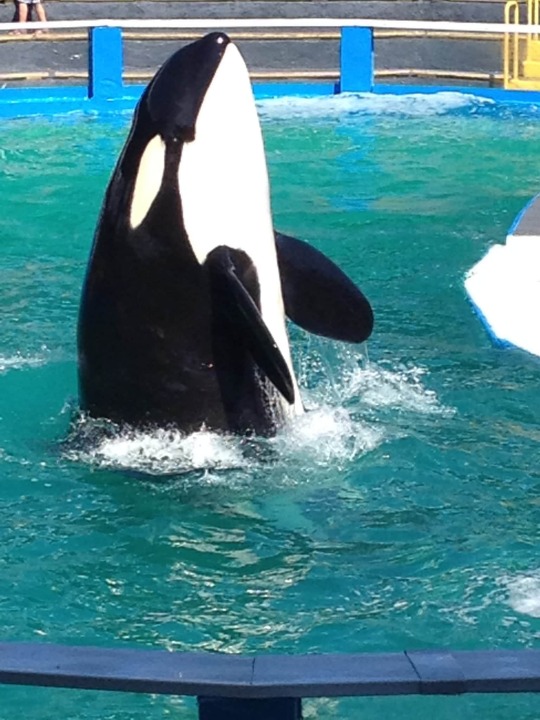
28 notes
·
View notes
Text
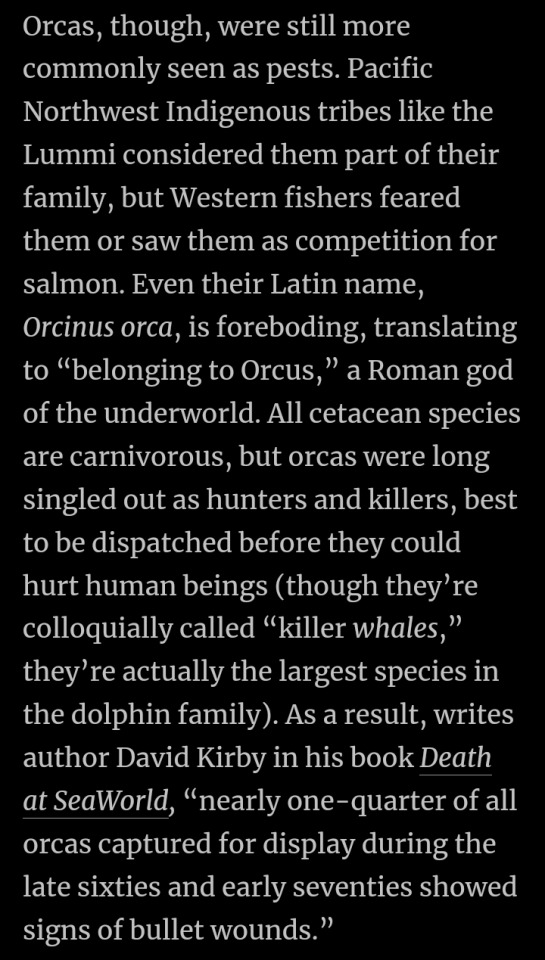

0 notes
Text
Late Mermay idea!
Orca mer Ghost in an aquarium but he is almost always hiding and quite depressed so the aquarium decide to give him a little more enrichment.
With humans lack of mer knowledge they come to the conclusion that because orcas eat seals then surely an orca mer would eat a seal mer. They decide that during closing hours (to avoid guests seeing the blood bath that will surely follow) they will drop a live seal mer into ghosts tank so he has the natural experience of hunting instead of just being fed slabs of meet.
But mer’s don’t eat other mers, regardless of secondary species.
So when seal mer soap is dropped into his tank, ghost just thinks he’s being given a very energetic handsome roommate.
And the humans are confused as to why ghost hasn’t eaten the seal mer yet
#mermay#mermay 2024#soapghost#ghostsoap#soapghost mermay#seal mer soap#orca mer ghost#call of duty#cod mermay#I’ve got a few other ideas for this au#but a lot of that involves mpreg lol#I wonder why they didn’t feed me dinner ghost says to his dinner#I image that ghost is one of the only larger predatory mers in captivity#most can’t survive in captivity#but something like a seal mer is easier to keep in captivity#so while humans know a good amount about seal mers#orca mers are a lot more of a mystery#so ghost was caught from the wild#and maybe soap was born in captivity#and I mean he would have been sold to this aquarium under the assumption that he was going to be eaten#but instead he made best friends with the orca he was ‘fed’ to#and then they fall in love <3#and I mean the humans originally did this so ghost would stop being so gloomy#so I mean their plan did technically work#because ghost is much happier with his bf the he was before#anyways let me know if you wanna here about the mpreg ideas#of course ghost is the pregnant one lol
444 notes
·
View notes
Photo
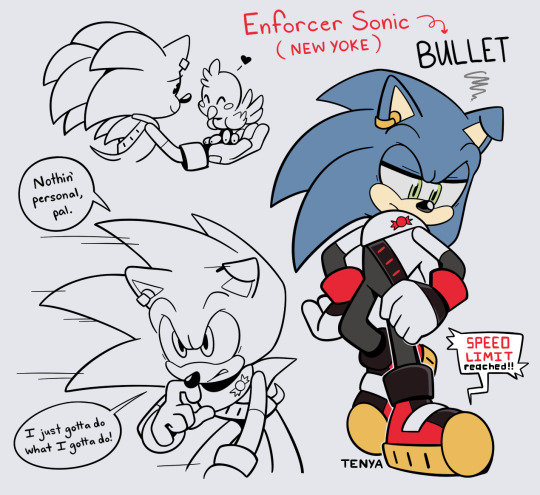
new yoke sonic :^)
the palm tree is great and all, but what about the flickies?? in this backwards world, those little animals are his only friends, so he’s willing to do whatever it takes to protect them. when the chaos council took over, they were in great danger, and bullet made the tough choice to trade his freedom for their safety, acting as an enforcer on their behalf.
#sonic#sonic the hedgehog#sth#sonic prime#bullet#YIPPEE!!!!!#scribbles#reluctant villain sonic let's GOOOOOOOOOOOOOOOO bro#his ear is bent like an orca in captivity :)#i'm thinking there'd be a role reversal too like you know how in canon it's sonic who comes to tails' aid and that's how#they become friends well in this it'd probably be nine who (eventually) comes to bullet's aid#but in the meantime him and rusty fighting together? scary. the resistance definitely has their hands full lol
3K notes
·
View notes
Text
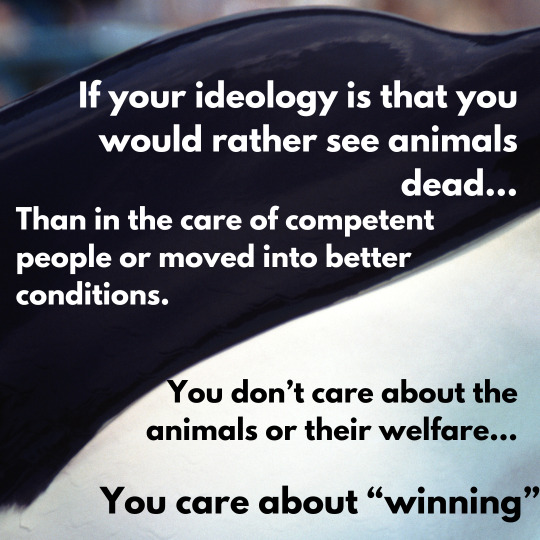
This goes for all extremists “animal rights”, Better Dead Than Fed movements but especially for the “Empty the Tanks” activists that continues to block the movement of orcas out of poor conditions and into a better facility because it’s not a sanctuary (sanctuaries for orcas have not been built or established as a viable option in any way)
This is also for all the people whose response to a loved animal dying in human care to be “good, at least he can be free now” or advocating for orcas in human care to be “put out of their misery” if they can’t be moved to a (nonexistent) sanctuary.
Your goal is to get a win, your goal is be right and to assure yourself on how morally superior you are about your stance. And your position on this is only true if the animals are suffering. So you want them to be suffering so that you’re right and will attack anyone trying to educate you otherwise.
You don’t care about these animals as individuals with needs and personalities. They are whatever you project your own miserable thoughts onto.
I’m sick and tired of governments listening to these unhinged lobby groups that are living in a reality that doesn’t exist. Sanctuaries don’t exist. Orcas in human care aren’t longing for the ocean. Most of them don’t know what an ocean is.
Marineland Antibes is objectively not fit to house their orcas anymore, their orca habitat is quite literally falling apart. But the activists want the orcas to stay and be "sacrificed" for their cause.
I'm so tired of this.
French source
#cetacean welfare#orca welfare#blackfish#empty the tanks#anti captivity#are you happy now guys? the tanks are emptying at the expense of the animals that you claim to be protecting
143 notes
·
View notes
Note
If this was asked before go ahead and skip it, but how would Orca Eclipse react to a siren Y/N who's a captive bred/raised orca siren who was released by humans? And they have all the hallmarks of orcas in captivity, like a collapsed dorsal fin, scars and scrapes from infighting or a tiny aquarium, teeth worn to the root, and/or poor survival skills?
Eclipse would only see your clear weakness in surviving, along with your scars, and think that clearly, you need him. The concept of captivity is one that has never been presented to him before, and while he notes how poor of health you are in and that you are very clearly not doing well, he doesn't understand why. He will of course prod and demand. When you give up the reasons for your collapsed dorsal fin and scraps and how you hate close spaces under the ice, he will at last understand. And he will be furious for you. He will rage and threaten and promise that never again will you be held in a tiny pool nor treated with so little dignity.
He will ensure they never find you again.
63 notes
·
View notes
Note
I don't know how "ask box trick or treat" works, but hi, I bring you a photo of my most beloved plushie since I was about 4, in return for a trick or a treat perhaps? Their name is Finke

(Pls excuse the fact that I managed to accidentally unfollow for a moment while trying to send an ask, whoops)
Ohh thank you for the trick or treat, you did perfectly! I love your little plushie, they are so cute and the name Finke is really sweet. I also have a very old killer whale plushie however they don't have a name. For you I made this painting as a treat:

"You were my friend"
It's about the killer whales from long ago who lived under human care, when marine parks were just starting out. And the things they went through because people back then didn't really know what they were doing yet. Pools too small, healthcare very subpar, training not up to modern standards. Whales were regularly manhandled for procedures, or the pools simply drained for cleaning or vet checks. And yet these animals placed their trust in the people they met. Even if those only stayed a while, came and went, put them through painful procedures, took care of them only as a summer job.
It is strange, looking at those old grainy black and white photos. Like a different world back then. All these whales. All these people. The blurred face of the trainer is supposed to represent the anonymity of the people they met. Contrasted with the delicate trust they received from the whales regardless.
#sorry for the long wait!#this painting turned out more detailed than expected#but i'm very glad to have finished this#i have feeling when looking at old grainy black and white photos of killer whales with their caretakers#like a different world back then#also please don't see this as a platform to kick off angry anti-captivity discourse#this painting is not meant as hate art towards cetaceans under human care#au contraire#just a recognition of how far we have come#and how far there will always be to go#paintings#digital art#Killer whale#Orcinus orca#orca
63 notes
·
View notes
Note
When horses end up with severe leg/hip injuries, they are almost always put to sleep. The odds of recovering full mobility from such injuries are slim and the odds of reinjury are high, so even if the horse is perfectly healthy in all other aspects, it is generally recognized to be more humane to put them down than to keep them alive just to live the rest of their lives limping around a small paddock or stall. A life for a horse in which s/he cannot gallop, leap, explore and play is no life at all. Why not apply the same logic to cetaceans? A life for a cetacean in which they can’t dive hundreds of meters, make meaningful autonomous choices (“should I play with the rubber ball or the puzzle feeder today?” is not a meaningful choice; research has shown that autonomy is crucial for animal welfare), echolocate and experience the rich biodiversity of the ocean is no life. I really don’t understand why it’s so horrible to think it more humane to euthanize a confused and sick orca calf if there is no chance of rehab and release than to take her/him permanently into captivity. It’s not disparaging or hateful to cetacean trainers to say so—I know they care about animals—it’s simply a logical ethical stance. Instead of searching in vain for orca conservation organizations that aren’t “radically anti-captivity”, maybe pro-caps should look inwards and ask themselves why all the major orca organizations (Center for Whale Research, Orca Behavior Institute, OrcaLab, Wild Orca, Orca Conservancy, Far East Russia Orca Project, etc.) as well as some cetacean organizations (ex. Whale and Dolphin Conservation, Cetacean Society International) oppose captivity. Is it because all of these esteemed groups, which if you look them up are all staffed by credentialed scientists, have been duped by the “animal rights agenda”, or could it be because maybe, just maybe, they know what they’re talking about? If captive orcas are so different from wild ones that wild orca biologists have no credibility to speak about their welfare, then that’s a clear indictment of captivity already.
Hi. I'm sorry for not answering right away, I was still at my externship when I got your ask, and I wanted to be able to sit down and give you a proper answer. So unfortunately, I don't think what I say will satisfy you. I don't expect to change your mind, nor is that my goal here. I only want to explain why I believe the way I do, so that you or others reading this can at least understand that it's not a position I take lightly, nor do I think it's infallible.
(Long post below the cut):
To start off, as an (almost) veterinarian, there are absolutely plenty of circumstances where I find euthanasia to be the correct decision. Euthanasia is our final gift to our patients, a swift and painless death in the face of prolonged suffering or poor quality of life. A large dog with debilitating osteoarthritis. A cat with terminal lymphoma. A down cow. A raptor with an amputated leg. Or like you mentioned, a horse with a fractured hip. These animals would live in a constant state of pain that they don't understand, and death can rightly be considered a kindness to them.
But an otherwise healthy orca calf? I would consider that a false equivalence. I agree that life in the wild should be prioritized whenever possible, and that captive orcas lead very different lives than their wild counterparts. But if that orca cannot return to the wild (orphaned and unable to be reunited with its pod, habituated to humans, non-painful disability such as deafness), and there is a facility willing to take it on, I do not think euthanasia is an appropriate option. In human care, that calf can still swim, breach, and dive, even if not to the same depths as the ocean (it's also worth noting that these are all costly behavior energetically and are not performed for no reason). It can still socialize and form family bonds with an adopted pod of whales. It can still (theoretically) mate and rear calves. It can still engage its big brain in problem-solving through training and enrichment in the place of hunting. And as a bonus, it will never go hungry and has access to veterinary care if ill or injured.
This is not a wild life. This is not the same life they would've, or should've known. A pool, no matter how well-appointed, is not the ocean, and we should not claim they're comparable. But I don't think it's a fate worse than death. I truly don't. But if it is... if freedom really is worth more than life, then all captive whales need to be euthanized. Even in a sea pen setting, they will not be free. They will not choose their food, their companions, their enrichment, their comings and goings. Those choices will still be made on their behalf by caregivers, and they will still have pretty much the same levels of autonomy as in their tank habitat. They will still be captive. (While some people do advocate for this, I don't think it's a popular outlook. Even SOS Dolfijn, a historically anti-cap organization, recently announced plans to build an aqauarium as a permanent home for non-releasable cetaceans rather than continuing to euthanize them).
Speaking of autonomy, yes, it is very important. But I truly don't think the orcas are distressed by the lack of meaning in choosing between enrichment devices. I think that's why we disagree on this topic... we have different worldviews. We both see orcas as beautiful, intelligent creatures, but I do not see them as people. They are animals, and for all their complexity, I interpret their behavior the same way I do any other species... they are motivated by food, reproduction, and (since they're highly social) companionship. Because of that, I still think we can give them a good life in human care, which is why it frustrates me to see the zoo community throw up their hands and give up rather than trying to improve our current less-than-ideal setups (*shakes my fist at the Blue World project*).
Now, I don't think it's wrong to be emotional about animals. I most definitely am! And it's very clear to me you love orcas and care about their wellbeing deeply. I admire that about you, and I appreciate your passion.
On to the next point... in the cetacean world, I've found that there is an unfortunate divide between researchers and caregivers who work with cetaceans in human care and those who study them exclusively in the wild. And that schism far predates the Blackfish era. Most of those organizations you listed are indeed legitimate, and I fully support their vital work and encourage others to do the same. A few of them, though, share things like this:
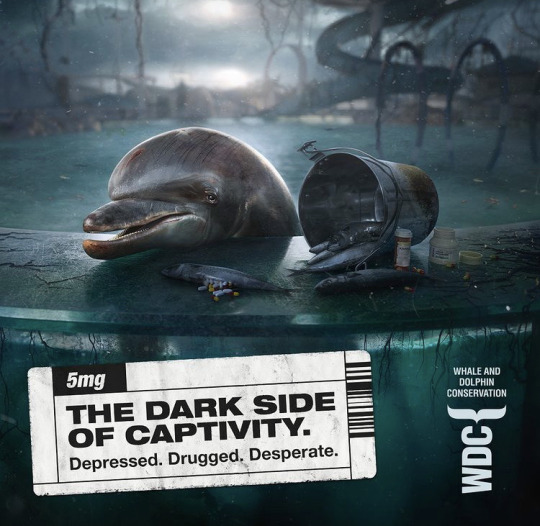
I think you can understand why this hurts me. And it's a lie. I've now interned at three aquariums (two of them AZA-accredited) that house various species of cetacean, and it's impossible for me to reconcile what I know and have seen to be true and what Whale and Dolphin Conservation wants the public to believe: that these unbelievably loved, vivacious animals are drugged and tortured by their greedy captors. It's not true, and I do not appreciate WDC for spreading this creepy artwork around. Nor do I think that fighting captivity is a beneficial allocation of resources when there is an overwhelming number of genuine threats to the survival of wild cetaceans.
Anyway, back to the scientists. Personally, I don't consider researchers who work exclusively with wild orcas to be either superior or inferior to those who work with captive whales. And sometimes I wonder how much of their position is a self-fulfilling prophecy: if someone opposes captivity on moral grounds, they won't work with captive whales, so they'll never get to know what their lives and care are like beyond maybe a single tour of the park or memories of how things were done in the 1960s (like Dr. Spong, who worked with some of the very first captive orcas at the Vancouver Aquarium).
I also don't think it diminishes the expertise of wildlife biologists to say that they are not experts on husbandry, training, or medical care... those are very different fields, and ideally, they should all inform each other. And of course, there are folks who work with both wild and captive whales. One of the reasons I linked SR3 in my previous post is they have staff with backgrounds in both managed care and research of free-ranging populations (I actually have no idea what the organization's official stance on captivity is, it's not something they address).
Maybe I'm wrong. I try my best to keep an open mind, but I know I'm also swayed by my own preconceptions and experiences. When I started this blog in December 2020, I was a first year vet student with minimal actual experience outside of domestic animals and some herps, and had only recently adopted the pro-captivity outlook. Now, I'm much more deeply involved in the zoo and aquarium world. These are people I know and respect, people who have written me letters of recommendation and comment on my Facebook posts, people I've had dinner with and showed up with after hours to care for a sick animal. And I recognize that biases me. The zoo world is often resistant to change, especially folks who have been in the industry for many years. And that doesn't do anyone, especially the animals, any good. I don't want to get stuck in an echo chamber, so I make it a point to read anti-captivity literature, even when it upsets me. If there is anything I can do to improve their lives, I want to learn about it, regardless of the source.
I try to adapt to new information. For example, in the past few months alone, I've become a lot more favorable toward the idea of sea pen habitats. My concerns about "sanctuaries" are more logisitical* and philosophical** rather than the idea that artifical habitats are inherently superior to pen habitats (they're not), especially when plenty of traditional facilites already make great use of ocean pens or enclosed lagoons. There are pros and cons to both, and a lot of it depends on the needs of the individual animals.
*funding; maintenance; lack of land-based backup pools and fully-equipped medical facilities; introducing immunologically naive animals to pollutants and infectious agents; disruptions to native wildlife; staffing activists and wildlife biologists rather than those with relevant husbandry experience
**villainizing aquariums; promoting the project as a "release to freedom" to the public when it's really another form of captivity; claiming the animals' lives will be "natural" when they will still require training, artificial enrichment, contraceptives, and social management if done correctly; downplaying or completely denying the very real risks of such a transition and insisting the animals will automatically be better off when Little White and Little Grey have proved that's not the case
If you made it to the bottom, thanks for reading. I wish all the best for you, and I mean that genuinely ❤️ even if we disagree, I hope you can appreciate our shared love for these animals and a desire for their wellbeing. Best of luck in all your endeavors!
#also no hard feelings if you unfollow me#I understand#orcas#killer whales#dolphins#cetaceans#marine mammals#animal welfare#cetacean captivity#pro captivity#anti captivity#aquariums#answered asks#anonymous
178 notes
·
View notes
Text
it's actually unbelievable that an orca has never killed a person in the wild, ever. they are so fucking huge and entirely carnivorous. i heard a scientist say like "orcas will not harm you and the reason they won't is because. they don't want to. that's the only thing stopping them" one time and i was like "idk i know she's a marine biologist but that sounds a little too confident" but no. an orca has never killed a human outside of captivity, as far as we know
#also i wouldn't recommend looking up the ones that have killed people in captivity it's pretty gruesome not worth reading about#and there's really only one reliable report of an orca attacking a guy in the wild that i could find#not killing him just biting him. while he was surfing with seals which. are what orcas eat#which sounds like accidentally biting into a guy who happens to be rolling around in a bunch of hamburgers
40 notes
·
View notes
Text
The anarcho-pods strike again!
https://www.washingtonpost.com/climate-environment/2023/11/06/orcas-attack-yacht-gibraltar/


#wild orcas#southern resident orcas#captive orcas#orca splatoon#orcas#orca whale#idate orca#orca!eclipse#orcinus orca#orca#ausgov#politas#auspol#tasgov#taspol#australia#fuck neoliberals#neoliberal capitalism#anthony albanese#albanese government#eat the rich#eat the fucking rich#fuck the gop#fuck the police#fuck the patriarchy#fuck the supreme court#fuck the tories#fuck the system#class war#classism
29 notes
·
View notes
Text
Orcas, at the Utah Natural History Museum
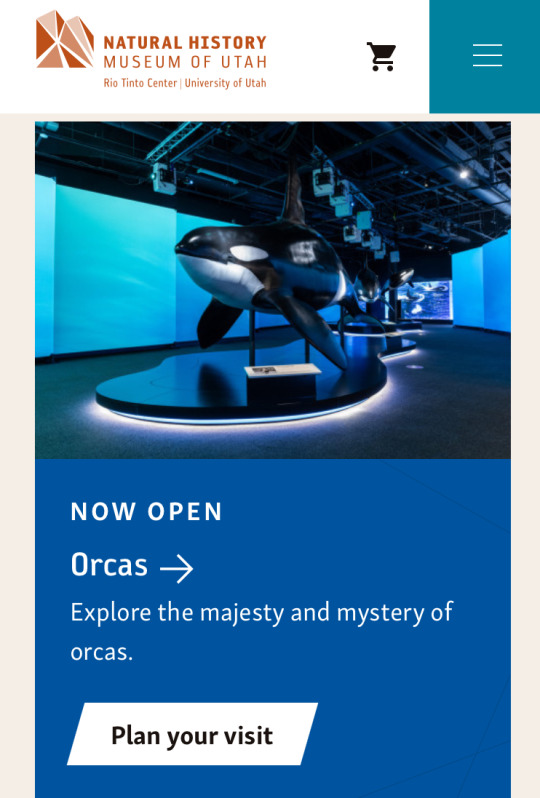
The Utah Natural History Museum recently opened an exhibition on orcas. It’s really good, and I highly recommend it if any of you have the chance to go. I wish I had taken more pictures.
The display covers a lot of topics, e.g. natural their natural history, pod/ecotype dynamics, neural anatomy, echolocation, significance to indigenous cultures, conservation, etc. They had a life sized model of Ruffles, and even highlighted how it was discovered that Ruffles was unrelated to Granny! Oh, and some of their models even had a few rake marks on them. Loved that attention to detail.
The section on orcas and indigenous cultures was fascinating! Indigenous voices really took center stage there and I learned a lot about just how significant orcas are to many Pacific Northwest tribes.
It was very immersive and well done!
The overarching theme was our shared history and future with orcas. So not only was it just a bunch of facts about the animals, but it progressed through time, highlighting our changing perceptions of them. They briefly talked about Moby Doll, Skana, Namu, Keiko, Tokitae, Morgan and Tilikum. There were some (debatable) inaccuracies about Tokitae, but I do appreciate how they acknowledged Keiko’s release attempt didn’t work. They showed various orca themed memorabilia from the 60’s onward, which was cool.
They also pulled no punches in talking about the plight of wild orcas like the SRKW’s. They went into a lot of details about PCB’s, plastic pollution, Chinook salmon, boat noise, etc. It was heart wrenching and very well done.
And naturally…. yes Blackfish and the general anti captivity movement were highlighted. This was fine, the museum’s intent was to show how public perception progressed, and it wasn’t so much that they themselves took a side. It was just…. unfortunate the glaring blind spot it left.
There was some mention of the work trainers have to do to take care of their orcas, including some memorabilia from the Vancouver aquarium. But was kind of a blip where if you blink, you’ll likely miss it.
They mentioned the important work museums and labs do for research, as simply observing them in the wild can’t give us all the details we need….. but nothing about the research done at accredited marine parks, aside from just how public display changed how we used to fear orcas. Sealand of the Pacific was highlighted in one corner, with people like Steve Huxter* appearing in video. Comparatively, SeaWorld was barely mentioned in passing on the plaque about Tilikum, which I found odd.
My guess is that this was a combination of not wanting to piss off certain donors or contributors to the exhibit given how hot this topic is, and/or simply the lack of contributions from places besides Vancouver aquarium. Perhaps there were too many PR, bureaucratic hoops to jump through. Perhaps all of the above. Curating museum displays is a complicated thing.
I suppose if nothing else, this is true to how our history has progressed here. One side has come to dominate the public narrative, while the other has just clammed up. The biggest mistake SeaWorld and the larger zoological community made in the wake of Blackfish was to just stick their heads in the sand, hide behind their PR departments, and hope the controversy would just go away. Well, it didn’t. And the less we tell our stories, the more they win. They’ve done the work of cultivating media connections and media training. We haven’t.
This, like many other things, has the unintended side effect of erasing women from the picture. They mentioned Tilikum briefly, but said nothing of Dawn or the Dawn Brancheau Foundation (then again, they may not have gotten permission to do that).
Most marine mammal trainers are women, some of whom have gone on to make important contributions to the science of animal welfare, behavior and training…. do they deserve to be remembered only as anonymous pretty faces in wetsuits? Actually, I don’t remember them ever explicitly citing Ingrid Visser, Naomi Rose, or Lori Marino for that matter, not even in the areas about field research or orca brain MRI’s. There’s plenty to criticize about their anti-captivity lobbying to be sure, but they have made some key contributions to scientific literature. So it’s odd they wouldn’t even be mentioned by name given both that and their place in the anti-captivity movement.
Alas. I am not a museum curator, and while I disagree with Blackfish et al., I do think the museum handled the topic very well overall. It is good to be exposed to different points of view, and the truth is that there are valid points to be made about the ethics of orcas in captivity. So how do we go forward from here? Do orcas deserve special legal protections as non human persons? That was a question left open to the interpretation of the viewer, even if slanted somewhat in one direction. I love it when displays can pull that off.
Or at least, they handled it well except for when they talked about Morgan. I am pretty sure that the Free Morgan Foundation was not only the sole contributor to that part of the display, but was given a huge amount of editorial leeway in what little information was provided. The rhetoric in the writing alone was a dramatic departure from how the rest of the exhibit was handled.
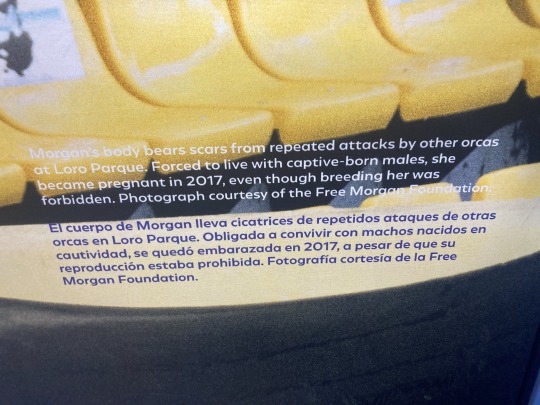
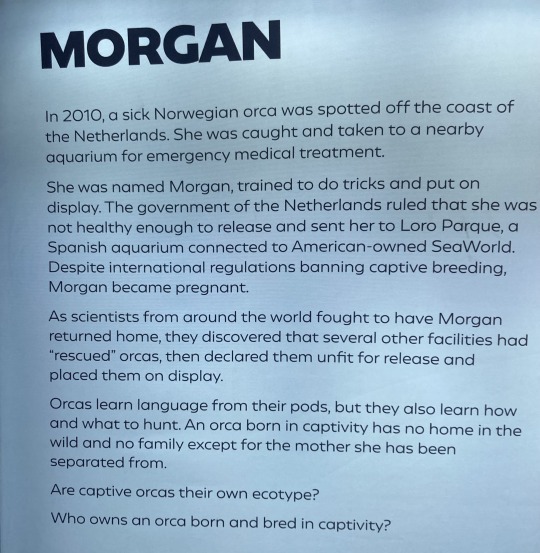
So. Many. Problems with this!
First of all, Loro Parque is not connected with SeaWorld. They’ve had a business relationship in the past in that SeaWorld gave them some orcas on a breeding loan, and then eventually transferred ownership of said animals completely to Loro Parque. Their veterinarians and trainers have networked/collaborated with one another in the past. But that’s it. That is the extent of their relationship. That is not the same thing as being “connected.” They are not affiliated with one another. They are two completely different parks owned by two completely different companies. This is such an important legal distinction, how do you get this wrong!?
There are no international regulations that ban orca breeding. Some countries or localities have banned it, but this is not universal. The part about Morgan not being allowed to breed was misleading. When SeaWorld ended their breeding program, they still owned the male orcas at Loro Parque. As such, they were not allowed to breed them until ownership was transferred. SeaWorld never claimed ownership of Morgan.
There’s no mention of Morgan being deaf, which is one of the key reasons why she can’t be released. This was confirmed by multiple third party studies, including the US Navy. Cases brought by the Free Morgan Foundation to multiple courts to have her released have each been dismissed.
And as for scientists supposedly discovering multiple fake orca “rescues” ….I’m sorry, which orcas are they referring to? With exception of the Russian Whale Jail and some facilities in China and Japan, marine parks have not been collecting orcas from the wild for decades. Most orcas alive today in Western parks were born in captivity. We know which orcas are which, where they are housed, and where they came from. Morgan was an exceptional case. So what in the world are they even talking about here!?
Further, marine parks are not the ones who decide whether or not an orca is releasable. Government agencies do.
Orcas rake each other in the wild and in captivity. It can happen from aggression and also from rough play. This is normal behavior. The following is an actual peer reviewed study on the social interactions among the orcas at Loro Parque. https://scholar.google.com/scholar?hl=en&as_sdt=0%2C13&q=Loro+parque+orca+communication&oq=loro#d=gs_qabs&t=1731592546318&u=%23p%3DHSC5vZFo3tcJ
Just. So many problems here! Who wrote this!? Seriously, I was able to handle the rest of the anti-cap stuff there up until that point. I had to really bite my tongue to keep myself from getting on a soapbox with my friend in public. Oh well. It was only a very, very small part of the exhibit at least.
(*I’ve actually had a few online conversations with Steve Huxter. While I disagree with him on a lot of things relating to wild vs captive orcas, I do think he’s a genuinely nice guy whose heart is in the right place. I can’t imagine what it must have been like to have been there when Keltie Byrne was killed).
#Orcas#animal welfare#blackfish#Morgan#orca captivity#seaworld#Utah Natural History Museum#Loro Parque#Anti cap vs Pro cap
13 notes
·
View notes
Text



#90's movies#jason james richter#captivity#family movies#warner bros#killer whales#killer whale#whales#whale#aquatic#oceans#marine mammals#90s kid#90s#90s nostalgia#1990s#movies#movie review#movie recommendation#michael madsen#adventure movies#free willy#whale movie#orca#orca whale#classic movies#marine life#90s classic#90s films
19 notes
·
View notes
Text
I have this one cousin whose very sweet but she seems to believe she's the only person in the world who knows how to keep animals correctly and it drives me a little insane... she's convinced zoo animals are all suffering deeply, which I can kind of understand depending on the species and context? but at the same time doesn't seem to comprehend that receiving regular meals and health check-ups from vets will and can expand their life-span and reproductive capacity, even if their care doesn't mimic their wild environment perfectly... don't get me wrong the ethics concerns for keeping captive wildlife are huge despite valuable contributions to our understanding of otherwise remote and elusive animals, but food is generally a number one constraint on survival (and therefore energy available for reproduction).
at least she's not trying to sell me blue buffalo kibble anymore (she was a sales rep) despite having an exclusively raw fed cat for the last decade but. well it's like that!
#most non-domesticated animals would not choose captivity but you can bet your ass they're better fed than their wild counterparts#the trout we keep at work mature 1-2 years earlier than they do in the wild and it's purely because of food availability#this doesn't count for shit like orcas though obviouslyyyyy
6 notes
·
View notes
Text

Hi,
here I am again, because of a sudden impulse and deep thoughts. The subject of the captivity of orcas has always caused me sad emotions. Recent events in my life have allowed me to see the sad connection and my own symbolism in these animals.
I wanted to draw a sad flipper, but the pose wouldn't let me, and I probably would have made it suck.
I was inspired by Drezzdon's tik tok: https://www.tiktok.com/@drezzdon
Ref photo I used: https://gifts.worldwildlife.org/gift-center/gifts/Species-Adoptions/Orca-Whale
Background text: https://www.nationalgeographic.com/animals/article/orcas-captivity-welfare
Take care of yourselves folks.
9 notes
·
View notes
Text
youtube
It looks like they've introduced live fish into the SeaWorld San Diego orca habitat for enrichment! This is so awesome to see and fantastic for the public to watch as well! It also means the orcas will be getting a lot more exercise and enrichment outside of sessions, which is great!
I'm hoping this continues and is rolled out at the other parks as well - it also depends on how the other orcas would respond. Anecdotally I have heard Katina gets a bit spooked by live fish.
It'll also be interesting to see if the orcas can do sessions in that pool and not get distracted or annoyed by the fish... that happened a lot with the dolphins I worked with in ocean facilities.
#SeaWorld#Blackfish#orca#killer whale#orca captivity#cetacean welfare#watch all the anti caps totally ignore this footage and keep showing their 2 minute video of orcas resting and saying that means they're sa#Youtube
53 notes
·
View notes